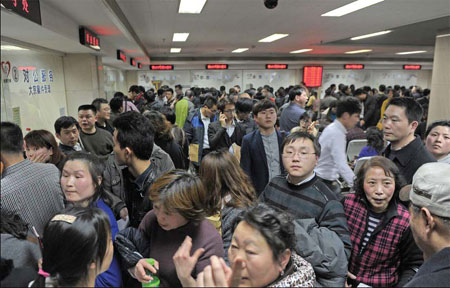IN BRIEF (Page 2)
Updated: 2013-03-08 08:53
(China Daily)
|
|||||||||||
|
The Nanjing Property Registration Center in Jiangsu province is packed with homebuyers and property agents on March 4. People waited in long lines to complete transactions as soon as possible to avoid a new tax as high as 20 percent on the profit they make on the sale of their property. The current tax is only 1 to 2 percent of the total sale price. Yang Duoduo / for China Daily |
Science
Jiaolong set to dive in June
The deep-sea submersible Jiaolong has undergone a series of upgrades and will head to the South China Sea and the Pacific Ocean in June for a series of dives.
Liu Feng, director of the China National Deep Sea Center, said the first dive will be in the South China Sea in June, for scientific research, while the rest will be conducted in two areas in the western Pacific in July, pending approval by the International Seabed Authority for China's application to explore for cobalt-rich ferromanganese crusts.
Jiaolong reached its record depth of 7,062 meters in the Mariana Trench in June last year, proving China's capacity to explore 99.8 percent of the world's ocean floor.
Health
Call to beef up rare-disease diagnosis
Hospitals should improve their efficiency in screening for rare diseases, and the government should work to lower the financial burden faced by sufferers, said doctors and leaders of social organizations.
The genetics branch of the Chinese Medical Association defined a disease that has an incidence rate lower than one in 10,000 among newborn babies, and a prevalence rate lower than one in every 500,000 people as a rare disease in China.
"Right now there are 5,781 kinds of rare diseases diagnosed around the world, and about 44 percent of rare disease patients have been misdiagnosed," Li Dingguo, chairman of the rare disease branch of Shanghai Medical Association, said on Rare Disease Day, which fell on Feb 28. It is estimated that there are more than 10 million people carrying rare diseases in China.
Environment
Shanghai to pilot PM2.5 study
Shanghai is likely to become the first city nationwide to pilot PM2.5 forecasts, as national legislators submitted proposals to address thorny environmental issues.
"We will try to report PM2.5 data one day in advance by the end of this year. The time will eventually be lengthened to two days," said Zhang Quan, director of the Shanghai Environmental Protection Bureau.
He suggested that "ecological development" be written into the Constitution so environmental issues will be legally defined as a national priority.
PM2.5, or hazardous particulate matter of 2.5 micrometers in diameter or less that can penetrate the lungs, is closely linked to a number of significant health effects.
Environmental agencies currently report the air pollution figure in the latter half of the day. But delayed reports fail to send an early warning to alert sensitive populations, including people with heart or lung disease, children and older adults, said Zhang.
Finance
Overseas investment on the rise
Global investment by Chinese companies will grow rapidly "for quite a long time", said Chen Jian, vice-minister of commerce. At the same time, Chinese companies need to standardize and improve their operations overseas, he said.
Despite a worldwide drop in foreign direct investment since the outbreak of the global crisis, China's overseas direct investment has increased.
Last year, the world's second-largest economy saw its outbound direct investment grow by 30 percent to $77.2 billion (59.30 billion euros).
Chen expressed confidence that such growth momentum can be sustained over the long term and would maintain a double-digit increase this year.
Policy
Easing traffic tops Beijing agenda
Easing road congestion has been placed at the top of Beijing's work agenda this year.
The government has released a to-do list with 32 items to benefit people in 2013, five of which involved traffic, Beijing News reported.
The municipal government plans to finish 30 projects to address the traffic, open and change 40 bus lines and replace 3,000 old buses, according to the list. In addition, 20,000 parking spaces, 10 kilometers of bus lanes and more subway lines will be developed. By the end of this year, the length of subway lines in Beijing is expected to reach 465 km.
Law
Poachers feeling the heat
China has made significant progress in the fight against the illicit trade of wildlife products, including ivory and rhino horn, according to a top wildlife conservation specialist.
"China has been serious about strengthening its regulations and law enforcement against the illegal wildlife products trade," said John Scanlon, secretary-general of the Secretariat of the Convention on International Trade in Endangered Species of Wild Fauna and Flora.
"When we look at China, we must recognize the great efforts it has made," he said, adding that among 177 partner countries of the organization, China is one of the most actively engaged.
China Daily
(China Daily 03/08/2013 page2)
Today's Top News
List of approved GM food clarified
ID checks for express deliveries in Guangdong
Govt to expand elderly care
University asks freshmen to sign suicide disclaimer
Tibet gears up for new climbing season
Media asked to promote Sino-Indian ties
Shots fired at Washington Navy Yard
Minimum growth rate set at 7%
Hot Topics
Lunar probe , China growth forecasts, Emission rules get tougher, China seen through 'colored lens', International board,
Editor's Picks

|

|

|

|

|

|






